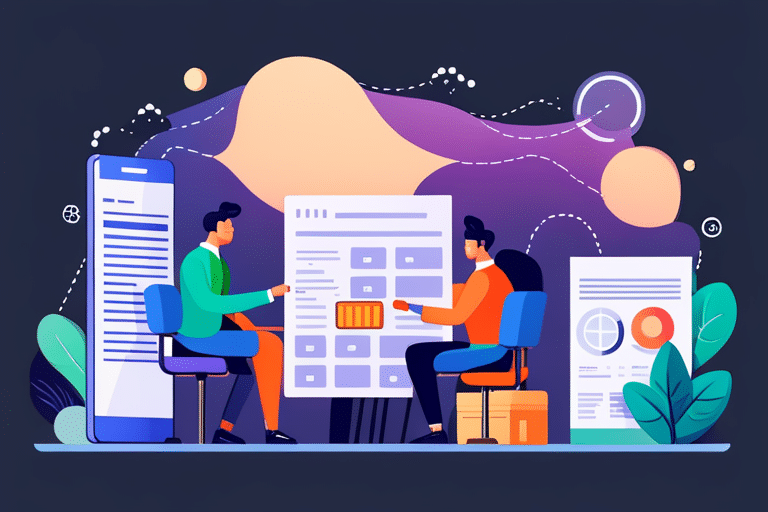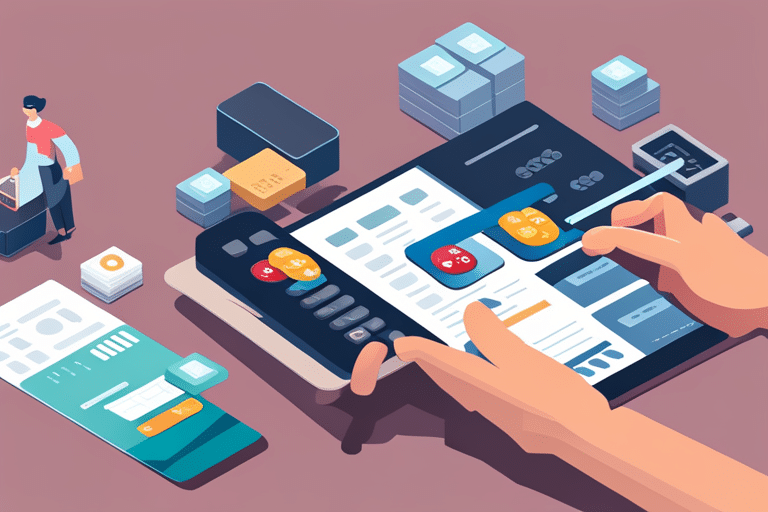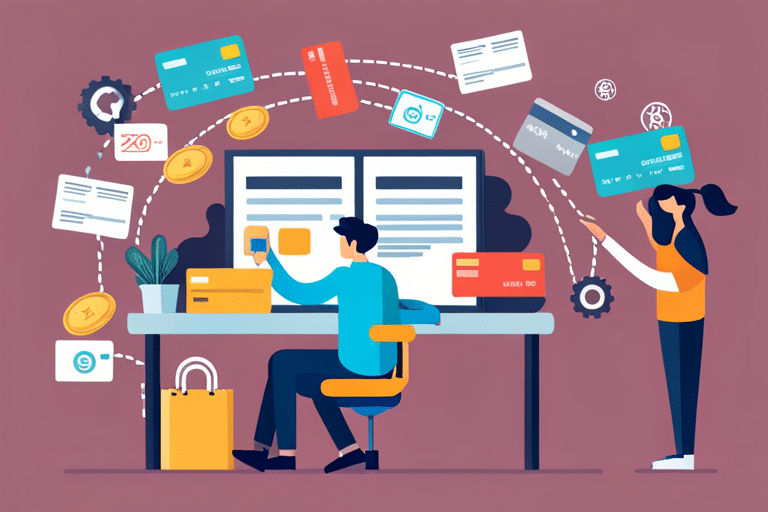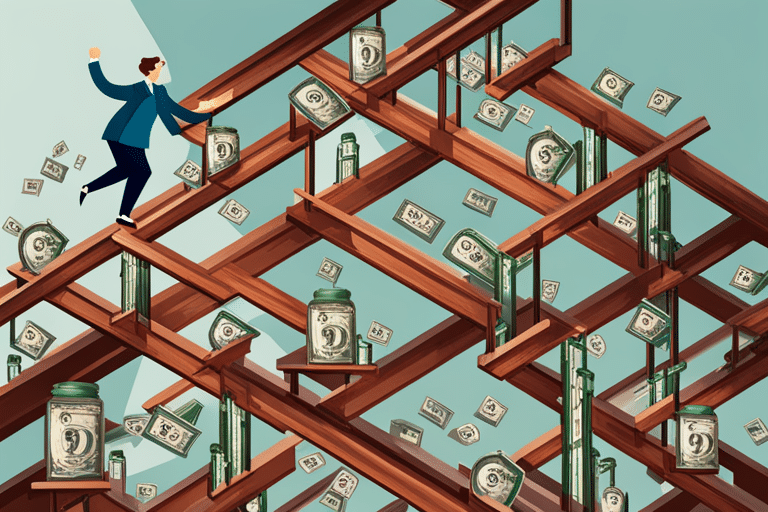Are you tired of feeling like your credit card debt is running the show? Well, fear not! In this article, we’re going to show you how to take charge and prevent credit card debt from ruining your finances.
You’ll learn how to assess your current financial situation, create a realistic budget, and manage your credit card usage like a pro.
So grab a cup of coffee and get ready to master the art of preventing credit card debt once and for all!
Key Takeaways
- Monthly interest charges can quickly multiply, leading to significant financial consequences.
- Setting spending limits and resisting unnecessary purchases are essential in avoiding credit card debt.
- Evaluating your current financial situation, including income versus expenses and debt-to-income ratio, is crucial in preventing credit card debt.
- Creating a realistic budget, accurately tracking expenses, and prioritizing essential spending can help prevent credit card debt and maintain financial stability.
Understanding the Impact of Credit Card Debt

Understanding the impact of credit card debt can help you avoid financial struggles.
Picture this: you’re standing on a tightrope, balancing your finances with one hand and a stack of credit cards in the other.
Suddenly, the wind starts blowing, and before you know it, you’re plummeting towards a pit of debt! Yikes!
But fear not, my friend. By understanding the consequences of credit card debt, you can steer clear of this financial nightmare.
The consequences? Well, besides being haunted by monthly interest charges that seem to multiply like rabbits, your credit score takes a nosedive too. Now that’s no fun at all!
So how can we prevent this disaster? Simple – set limits on your spending, pay off your balance in full each month (yes, really!), and resist the temptation to swipe for unnecessary purchases.
With these prevention measures in place, you’ll be dancing confidently on solid financial ground!
Assessing Your Current Financial Situation

So, you’ve decided to take a peek into your financial world? Good for you!
Let’s start by diving into the exciting realm of income versus expenses. Brace yourself for some serious number crunching and maybe even a few surprise expenditures along the way.
Don’t worry though, we’ll also explore that fancy-sounding debt-to-income ratio to ensure you’re not drowning in a sea of bills.
Ready to embark on this financial adventure? Let’s go!
Income Vs. Expenses
Take a moment to evaluate how much you’re earning versus how much you’re spending each month. It’s time for some financial self-reflection!
Imagine your income as a majestic river flowing into your bank account, with the potential to create a savings oasis. But wait, what’s that? A leaky bucket of expenses is draining away all your hard-earned money! Time to assess your savings potential and evaluate those sneaky spending habits.
Picture yourself as a detective, meticulously examining every penny that comes in and goes out. Are there any unnecessary expenses lurking around? Perhaps that daily fancy coffee or the impulse purchases that seem to magically appear in your online shopping cart. By identifying these culprits, you can start plugging those holes and redirecting more funds towards building up your savings.
Now that you’ve assessed your income and expenses, it’s time to dive deeper into the mysterious world of debt-to-income ratio…
Debt-to-Income Ratio
Assessing your debt-to-income ratio is crucial in determining how much of your monthly income goes towards paying off existing debts. It’s like trying to balance a plate of spaghetti on the tip of your nose – you want to make sure it doesn’t all come crashing down!
So, let’s get started and take a look at four key things you need to know about your debt-to-income ratio:
-
Debt consolidation: This handy tool allows you to combine multiple debts into one, making it easier to manage and potentially lowering your interest rates.
-
Credit counseling: Think of credit counselors as financial therapists who can help you create a budget, negotiate with creditors, and develop a plan to tackle that pesky debt.
-
Keep it below 36%: Ideally, you want your debt-to-income ratio to be below 36%. Anything higher than that might mean trouble ahead.
-
Plan for the future: Once you’ve assessed your debt-to-income ratio, create a plan that includes both short-term goals (like paying off high-interest debts) and long-term goals (such as saving for retirement).
Creating a Realistic Budget

Hey there, budgeting superstar!
Now that you’ve assessed your financial situation and successfully dodged the credit card debt bullet, it’s time to dive into the exciting world of creating a realistic budget.
This discussion will focus on three key points:
- Tracking expenses accurately (no more hiding those sneaky coffee runs)
- Prioritizing essential spending (who needs another pair of novelty socks?)
- Eliminating unnecessary purchases (say goodbye to impulse buys at the checkout counter).
Let’s get ready to take control of your money with style and a sprinkle of imagination!
Tracking Expenses Accurately
To accurately track your expenses, make sure you’re using a reliable budgeting app or software. Don’t rely on memory alone – let technology lend a helping hand! Here are four expense tracking techniques that will revolutionize your budgeting game:
-
Snap it like a pro: Take pictures of your receipts and let the app do the rest. No more rummaging through crumpled paper in your wallet.
-
Categorize with flair: Organize your expenses into categories that make sense to you. Fancy a ‘Treat Yo Self’ category for those guilty pleasures? Go ahead, embrace it!
-
Set alerts like a boss: Get notifications when you’re nearing your spending limit in certain categories. It’s like having a personal financial assistant who knows exactly how much you can splurge.
-
Get visual with graphs and charts: Who said budgets had to be boring? Watch as colorful visual representations bring life to your financial journey.
With these accurate budgeting and expense tracking techniques, staying on top of your finances has never been so fun!
Prioritizing Essential Spending
When budgeting, it’s important to prioritize essential spending, such as housing, food, and transportation.
But hey, don’t worry! Cutting back doesn’t mean you have to live like a hermit in a cave. You can still have fun while practicing financial discipline. Think of it as a game where you’re the master strategist.
Instead of eating out every day, why not try your hand at cooking? Not only will you save money, but who knows, you might discover that hidden talent for whipping up gourmet dishes!
And if you’re feeling adventurous, why not ditch the expensive gym membership and go for a run in the park or try some YouTube workout videos? Trust me, your wallet (and waistline) will thank you later.
Eliminating Unnecessary Purchases
Congratulations on mastering the art of prioritizing essential spending! Now, let’s tackle the next step in preventing credit card debt from ruining your finances: eliminating unnecessary purchases.
We all know how tempting it can be to splurge on that shiny new gadget or indulgent treat, but with a little self-control and some clever strategies, you’ll be able to avoid impulse buying and stay on track towards your financial goals. Here are four handy tips to help you:
-
Make a list before shopping: Having a clear plan of what you need will prevent those ‘Oh, I didn’t mean to buy that!’ moments.
-
Set a waiting period: Before making any non-essential purchase, give yourself 24 hours to think it over. You might find that the desire fades away.
-
Avoid temptation: Unsubscribe from retail emails, steer clear of online shopping sites when bored, and limit your time at malls.
-
Find alternative pleasures: Instead of using retail therapy as an emotional crutch, explore free or low-cost hobbies like hiking or reading.
By following these tips and flexing your willpower muscles, you’ll be well-equipped to resist unnecessary purchases and make progress towards your financial goals!
Now that you’ve got a handle on avoiding impulse buying and setting financial goals, let’s dive into the next section about managing credit card usage and payments.
Managing Credit Card Usage and Payments

Make sure you’re regularly monitoring your credit card statements to stay on top of your usage and payments.
It’s like being a detective, but instead of solving crimes, you’re solving the mystery of where all your money went! And trust me, there’s never a dull moment in this game.
One minute you’re earning those sweet credit card rewards, feeling like a financial genius, and the next minute you’re dealing with the possibility of credit card fraud.
But fear not, intrepid spender! There are ways to protect yourself. Keep an eye out for any suspicious activity on your statements and report it immediately.
Don’t underestimate the power of strong passwords and always be cautious when making online purchases.
With a little vigilance and some smart choices, you’ll conquer the world of credit cards like a true master!
Strategizing Debt Repayment

Ah, managing your credit card usage and payments was a breeze, wasn’t it? Now, let’s dive into the exciting world of strategizing debt repayment. Don’t worry, I promise to make it as fun as possible!
-
Negotiating Debt Settlements: Picture this: you’re in a room with your creditors, wearing a superhero cape and armed with your negotiation skills. You can propose lower interest rates or even negotiate a lump-sum settlement. Just remember to stay confident and keep your cape billowing!
-
Credit Counseling Services: Think of them as your personal financial therapists. These experts can help you create a realistic budget, develop a debt repayment plan, and provide guidance along the way. They’ll be like those cheerleaders on the sidelines of your debt-repayment marathon.
-
Debt Snowball Method: This strategy involves paying off smaller debts first while making minimum payments on larger ones. As you eliminate each small debt, you gain momentum (and confidence) to tackle the bigger ones.
-
Debt Avalanche Method: Here’s where we channel our inner mountaineer! With this approach, you focus on paying off debts with the highest interest rates first while making minimum payments on others.
Now that we’ve mastered some strategies for negotiating debt settlements and enlisted the help of credit counseling services, it’s time to move on to building an emergency fund…
Building an Emergency Fund

Now that we’ve covered debt repayment strategies, let’s focus on the importance of building an emergency fund for unexpected financial situations. Picture this: you’re peacefully sipping your morning coffee when suddenly, a meteor crashes through your roof. Okay, maybe that scenario is a bit extreme, but life is full of surprises. That’s why having emergency savings is crucial for maintaining financial stability. Take a look at this handy table to see just how important it is:
| Emergency Fund Benefits |
|---|
| Provides peace of mind |
| Protects against unexpected expenses |
| Prevents reliance on credit cards |
Having an emergency fund means you won’t have to stress about unforeseen expenses like car repairs or medical bills. It acts as your safety net, shielding you from debt and allowing you to tackle life’s challenges head-on. So start building that emergency fund today and be prepared for anything life throws your way!
Seeking Professional Help and Support

Seeking professional help and support can provide valuable guidance and resources to assist in managing unexpected financial challenges. So, you’ve found yourself in a bit of a financial pickle, huh? No worries! Here are four reasons why seeking professional guidance and emotional support is the way to go:
-
Expertise: These professionals know their stuff! They can analyze your situation, offer personalized advice, and guide you towards making sound financial decisions.
-
Resources: They have access to tools, calculators, and resources that can help you navigate through tough times. Say goodbye to endless Google searches!
-
Accountability: Sometimes all we need is someone to hold us accountable for our actions (or lack thereof). These professionals will keep you on track and ensure you stay committed to your financial goals.
-
Emotional Support: Let’s face it – money matters can be stressful. Having someone who understands your struggles and provides emotional support can make a world of difference.
Frequently Asked Questions
What Are the Consequences of Not Paying off My Credit Card Debt?
If you don’t pay off your credit card debt, consequences can be a nightmare. Imagine being chased by an army of debt collectors, haunted by high interest rates, and trapped in a never-ending cycle of financial stress. Avoid those pitfalls!
How Can I Effectively Track My Credit Card Expenses?
Don’t worry, tracking your credit card expenses is easier than you think! With the help of tracking software and budgeting techniques, you’ll be a master at keeping tabs on your spending in no time.
Are There Any Strategies to Negotiate Lower Interest Rates With Credit Card Companies?
To negotiate lower interest rates with credit card companies, try these clever strategies. First, gather all the courage of a lion and call your credit card company. Then, use your charm and wit to sweet talk them into lowering those rates!
What Are the Potential Risks of Consolidating Credit Card Debt?
Consolidating credit card debt can be tempting, but it’s important to consider the potential risks. While it may help simplify your payments, you could end up paying more in interest over time.
How Can I Rebuild My Credit Score After Experiencing Credit Card Debt?
To rebuild your credit score after experiencing credit card debt, you’ll need to take some steps. Boost your creditworthiness by paying bills on time, reducing debt, and using credit responsibly. You got this!
Conclusion
Congratulations! You’ve made it to the end of this article and now you’re armed with all the knowledge you need to prevent credit card debt from wreaking havoc on your finances.
Remember, it’s not just about avoiding debt, but also about managing your money wisely. Did you know that according to a recent study, 40% of Americans carry credit card debt? But fear not! With the tips and strategies outlined in this article, you’ll be well-equipped to stay out of that statistic and keep your financial future bright.
Happy spending (responsibly)!

